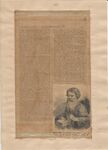< Personal Observations (continued from page 10-152) >
conjurers, and who hold themselves thereafter entitled to speak of objective conjuring tricks. Yet is W. Weber only one of a succession of investigators worthy of the highest respect-who, after similar careful testing, vouch for the reality of these phenomena, against the multitude of those who, so to speak, throw stones at them from a distance; in other words, heap against them all possible indefinite grounds of suspicion which can be thought, or indeed cannot be thought, with reference to the things as described, and so believe they have said something to the purpose. Superficiality in, this field is certainly far more on the side of the opponents than of the defenders of Spiritualism, among whom I reckon only those defenders who are outside of Spiritualism. Yes, even if Spiritualism were a perversion, the means used against it would be yet more perverse, and the fact that none better are found speaks for itself that there are none.
In all other departments of investigation conclusions are only drawn from successful attempts, and the failures are cast aside, just because they are failures; hut in relation to Spiritualism the reverse method is adopted by its opponents, who draw conclusions only from failures, and throw aside the successes just because they are successes. Had Zollner’s knot experiments not succeeded under the most stringent precautions adopted, stress would have been laid upon them; succeeding, they are worthless! But tricks, which every one can imitate who has learned the art—only not under those secure conditions—these count. And so with all successful attempts in this field conducted by good observers. Elsewhere, investigations in a new field of observation are carried on under the conditions of their success: here the conditions are prescribed beforehand; and if, for example, an attempt under safe precautions succeeds in the dark or in shade,* it is of no account because it was not in the light; if it succeeds also, under more favourable conditions, in the light, then is it of no account because it has succeeded at all! Elsewhere maturity of experience and of judgment arc considered favourable to every investigation; here they pass for senility, if the result is in favour of Spiritualism; and eggs esteem themselves here cleverer than hens. Elsewhere, if fingers point to things, one looks in the direction to see if the things are there; here, one hacks off the fingers that point to them, so that one first takes care not to see, and then writes treatises to prove that nothing is to he seen.
Why, now, instead of such methods, which only evince impotence in dealing with Spiritualism, not adopt the only'' sufficient one, that is, to oppose to the actual observations which evidence Spiritualism, others against it, carried out with the like circumspection, care, conscientiousness, impartiality, under just as many altered circumstances, with non-professional as with professional mediums, as the best of those which attest it? And is there nothing whatever of the kind? Truly! Only that this method, when it has been adopted, has led rather to compulsory recognition than to the designed refutation of Spiritualism; for, indeed, none of the physicists who have declared themselves for Spiritualism after searching and earnest investigation could have originally intended anything else than this refutation.†
Speaking and writing against Spiritualism go their way, and Spiritualism goes its way; hut the first way does not cross the latter at all, hut is merely beside it; and Spiritualism is not retarded in its advance by the outcries against it; that has proved so hitherto, and will he proved further,
If in the foregoing I have interested myself for the reality of Spiritualism, that is, as is not less evident from the foregoing, not from any sympathy with it, hut because justice is due to the tiling and to persons; for willingly as one might put aside Spiritualism altogether at any price, yet is the price of truth too high. The “Day-view” (Tagesansicht) can exist with or without Spiritualism: preferably, however, without rather than with it, for if in some weighty points they coincide, and the latter may, and I believe up to certain limits actually does, support the former, yet does , its abnormality disturb not only this, but the whole system of our previous knowledge; and only just on this account can I content myself with its reality, because I take account at the same time of this its abnormal character, owing to which it can find a, fitting place neither in the healthy life itself, nor in the healthy life of science. Now it is no satisfaction for the champion of the “Day-view” to be obliged to admit one more shady side in the account of the world. That I am not generally well disposed to mystical phenomena is proved by my pamphlet On the Last Days of the Doctrine of Od. However, I am seventy-eight years old, and have written the Zendavesta and this book, facts which will be more in requisition by opponents who encounter Spiritualism in the manner described above.
* That darkness is conducive to the success of spiritualistic, experiments should not appear so strange, the disturbance from an irritation on this side being thereby removed; in general, however, it has been shown that with stronger power in the medium the same experiments succeed also in the light which with less power require darkness or shade.
† With all deference to the learned author, such an intention, before all investigation, is hardly consistent with the “impartiality” (unbefaugenheit) which he has mentioned as one of the qualifications for arriving at the truth. —Note by Translator.

Editor's notes
- ↑ РУССКIЕ ТИПЫ by unknown author

